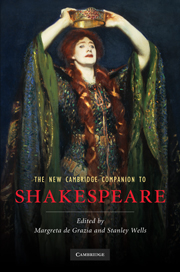Book contents
- Frontmatter
- 1 The traces of Shakespeare’s life
- 2 Shakespeare’s reading
- 3 Shakespeare’s writing: from manuscript to print
- 4 The theatre of Shakespeare’s London
- 5 The transmission of Shakespeare’s texts
- 6 Shakespeare and language
- 7 Shakespeare the poet
- 8 Shakespeare’s comedies
- 9 Shakespeare’s tragedies
- 10 Shakespeare’s English history plays
- 11 Shakespeare’s classical plays
- 12 Shakespeare’s tragicomedies
- 13 Shakespeare, religion and politics
- 14 Shakespeare and race
- 15 Shakespeare, sexuality and gender
- 16 Shakespeare on the stage
- 17 The critical reception of Shakespeare
- 18 Shakespeare and popular culture
- 19 Shakespeare and globalization
- 20 Shakespeare and media history
- 21 Shakespeare: reading on
- Index
7 - Shakespeare the poet
Published online by Cambridge University Press: 28 January 2011
- Frontmatter
- 1 The traces of Shakespeare’s life
- 2 Shakespeare’s reading
- 3 Shakespeare’s writing: from manuscript to print
- 4 The theatre of Shakespeare’s London
- 5 The transmission of Shakespeare’s texts
- 6 Shakespeare and language
- 7 Shakespeare the poet
- 8 Shakespeare’s comedies
- 9 Shakespeare’s tragedies
- 10 Shakespeare’s English history plays
- 11 Shakespeare’s classical plays
- 12 Shakespeare’s tragicomedies
- 13 Shakespeare, religion and politics
- 14 Shakespeare and race
- 15 Shakespeare, sexuality and gender
- 16 Shakespeare on the stage
- 17 The critical reception of Shakespeare
- 18 Shakespeare and popular culture
- 19 Shakespeare and globalization
- 20 Shakespeare and media history
- 21 Shakespeare: reading on
- Index
Summary
Everyone would agree that Shakespeare was a poet. We all know 'a bank where the wild thyme blows' and 'what light from yonder window breaks' and umpteen other set-piece descriptions and poetical rhapsodies from the plays. Compilers of anthologies of verse in Shakespeare's lifetime clearly regarded him as one of the finest poets of his generation. Readers of Robert Allot's England's Parnassus, or the Choicest Flowers of our Modern Poets (1600) could find passages from Richard III and Richard II, all duly ascribed to 'W. Shakespeare', set beside similar passages from Spenser, Marlowe, Jonson and Sir Philip Sidney. But Shakespeare was not just known as a poetical playwright at the close of the sixteenth century. At that date he was regarded more as a poet to be read on the page than as a writer of plays. In England's Parnassus quotations from the plays were outnumbered around two to one by extracts taken from his early narrative poems, Venus and Adonis and Lucrece.
It was of these poems that Francis Meres was thinking when in 1598 he described Shakespeare as 'honey-tongued'. Meres was also keen to show he knew that Shakespeare was at work producing sonnets: 'As the soul of Euphorbus was thought to live in Pythagoras, so the sweet, witty soul of Ovid lives in mellifluous and honey-tongued Shakespeare, witness his Venus and Adonis, his Lucrece, his sugared sonnets among his private friends, etc.' At the end of the sixteenth century the name ‘Shakespeare’ meant ‘ultrafashionable poet’, and by 1599 demand for Shakespeare’s poems outstripped supply so much that the entrepreneurial printer William Jaggard set about printing a slim volume which purported to contain lyrics by Shakespeare.
- Type
- Chapter
- Information
- The New Cambridge Companion to Shakespeare , pp. 91 - 104Publisher: Cambridge University PressPrint publication year: 2010
- 1
- Cited by

